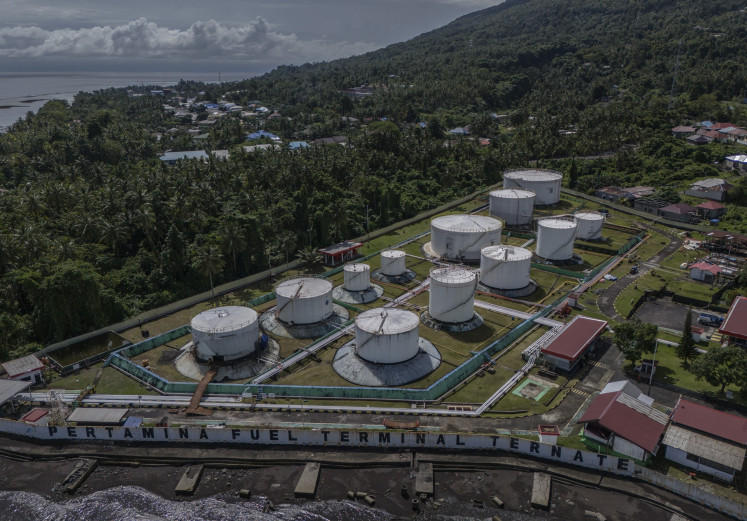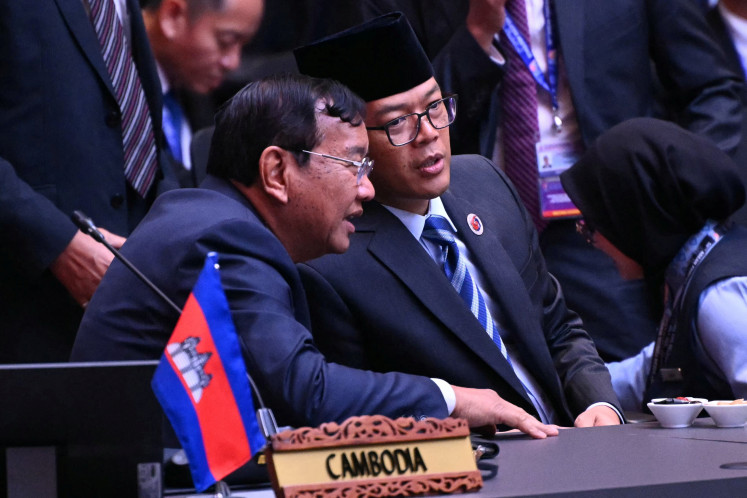Popular Reads
Top Results
Can't find what you're looking for?
View all search resultsPopular Reads
Top Results
Can't find what you're looking for?
View all search resultsFundamental issues in counterterrorism
Terrorism is a âmediated threatâ
Change text size
Gift Premium Articles
to Anyone
T
errorism is a 'mediated threat'. It requires an interpretation and definition from its audience for it to become terrorism. Certainly, the physical threat of terrorism needs no interpretation, but the fear toward it requires mediation.
For example, when Indonesian media depicted the situation at the scene of the Jan. 14 attack as 'terrifying' and the wider inhabitants of Jakarta became disoriented and paralyzed by both the attack and the misinformation that spread afterwards about other bombings and shootings that did not take place, we were in no doubt that an act of terrorism was unfolding.
Had the civilian deaths been caused by an ordinary crime or a traffic collision, fear and disorientation would not have reverberated on such a scale. The #WeAreNotAfraid movement, while appreciable as a social-resilience expression, does not deny this fear and it certainly does not deny the pressing need to work toward preventing terrorism.
Because the fear toward terrorism is mediated, the success of counterterrorism partly relies on mediation; government's response to terrorism should appear to the public as convincingly effective. The Indonesian public, as well as the terrorists, need to see that extremism, intolerance and their violent manifestations have no room to develop in the country.
Terrorism should be treated within a national security framework where all agencies are involved and empowered to shrink the room for extremist networks to grow.
It should be emphasized here that a national security framework does not mean a prioritization of the use of force; rather, it refers to a totality of coordination between all the required agencies. A state's response to terrorism should not empower only the police or security intelligence services; this will only fertilize departmental egocentrism that has already been endemic among the state's apparatuses.
At the moment, Indonesia already has an effective police counterterrorism unit, but every other agency's capacity to prevent acts of terrorism is doubtful.
How could the immigration agency let a convicted terrorist like Bahrun Naim go to Syria in early 2015? Why did the Law and Human Rights Ministry give remission to convicted terrorist Afif multiple times? How could Aman Abdurrahman indoctrinate them? How can the penitentiary system let terrorist prisoners communicate with their peers on the outside, publish their thoughts and indoctrinate fellow inmates?
Why did the ministries of social and religious affairs fail to integrate released prisoners back into society? Isn't terrorism an extraordinary crime? The Indonesian public will not be satisfied by amendments of the terrorism laws. Rather, an accountability report explaining all these issues is needed.
Otherwise, an attitude of tolerating terrorism will develop: What was once a 'we are not afraid' attitude will soon become 'we don't care'. When that happens, we can only hope that the police counterterrorist unit is still as reliable and the terrorists are still as inept as they are today.
All these questions also mean that after a dozen years Indonesia still has no blueprint for a counterterrorism policy that unites and coordinates all agencies. This should be the central task of the National Counterterrorism Body (BNPT).
Recently, the BNPT announced the formation of Terrorism Prevention Coordination Forums (FKPT) in all 34 provinces. It is still unclear, however, what exactly the FKPT will be doing and what objectives the BNPT has set for the agencies. Instead, the BNPT emphasized the need for the FKPT's legal coverage to make sure of the inflow of central and local government budgetary funds, which is certainly crucial.
However, we also hope that in a not too distant future the BNPT can also produce an assessment of the terrorism threat and of existing policies and formulate a coordinated response. Indonesia has relied too much on the capability of the security agencies to penetrate into extremist networks and maintain surveillance on them. This style of counterterrorism relies on the capacity of the state to control, and to some extent manipulate, a limited pool of extremists.
While extremism is still a limited feature of the nation's Muslim-majority population, it has gained a wider audience because of its continued evolution and fragmentation, the social media and ' more fundamentally ' a tolerance toward non-democratic styles of governance.
Consider the notion that in its battle against the Islamic State (IS) movement, Indonesia may not be able to publicly oppose the idea of an Islamic state because it tolerates sharia-based local governments.
The last but the most fundamental problem is Indonesia's national identity in counterterrorism. The type of identity the nation adopts determines the counter-narrative it puts forward. There are a number of identities that Indonesia adopts at the moment: Pancasila state and pluralist/moderate Muslim majority nation being the two most notable ones.
Indonesia has never defined itself, however, as a democratic state. There is not sufficient space to explain why this is the case; suffice it to say that it seems that in practice, Indonesian political leaders define democracy primarily as freedom instead of the rule of law and ethics.
In that sense democracy is problematic to be adopted as a national counter-narrative because demagogues and extremists can easily manipulate it to promote their ideologies. For counterterrorism, however, it is arguable that this means that Indonesia fights terrorism without ever designating the terrorists.
The legacy of Indonesia's counterterrorism lawmaking in 2002 and 2003 is an absence of its own 'list' of terrorist groups.
As a result, the nation relies on the designation of terrorists (individuals and groups) by the United Nations and the police's own identification of terrorist networks. Operationally, it can work; but consequently it means Indonesia never 'owns' its counterterrorism policy.
Designation of terrorist groups means more than just a list. It defines 'who we are' and, more importantly, 'who we are not' in the fight against terrorism. If Indonesia ever hopes to proscribe extremist ideologies and criminalize membership or involvement in terrorist groups ' as suggested to be the contents of a terrorism law amendment, which are critical for the purpose of preventing terrorism ' designating terrorist groups should be considered.
No doubt, the state will need to defend the justification of its terrorist designations, but it will initiate a critical dialog of who we are against and in what ways we should prepare to defend ourselves.
____________________________
The writer is a lecturer in the International Relations Department, University of Indonesia, Depok, West Java.










